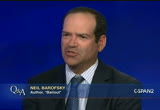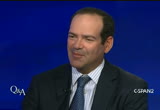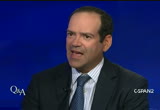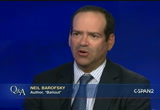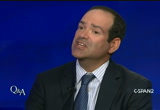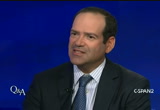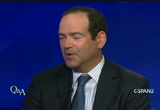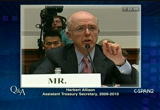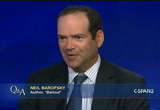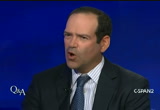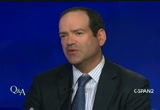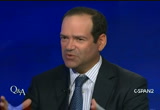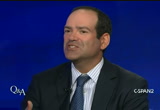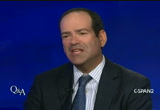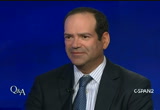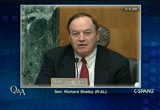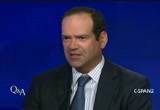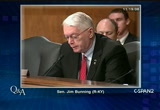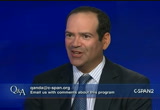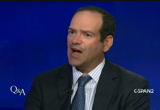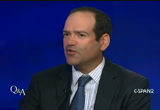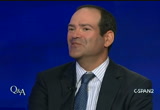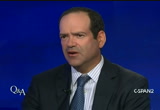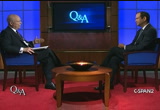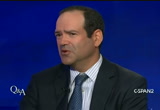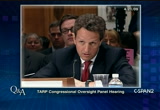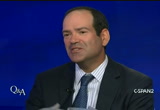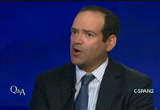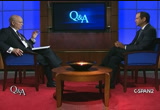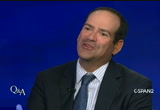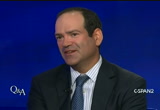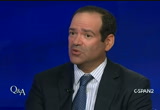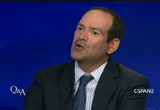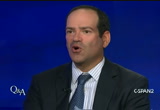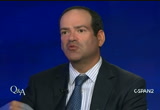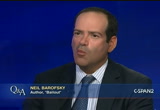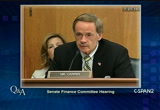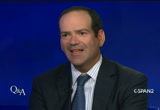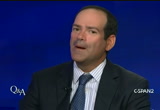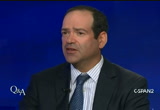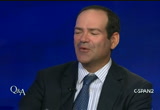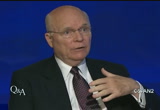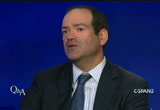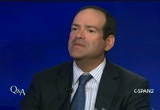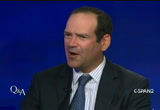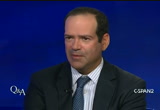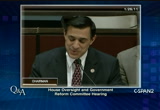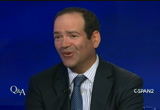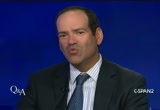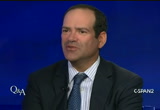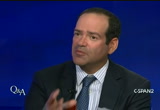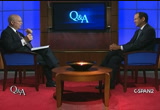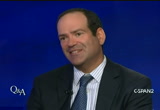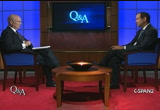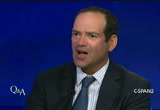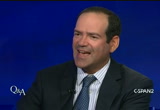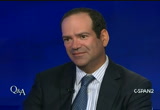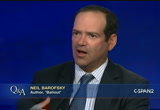tv Q A CSPAN January 10, 2013 7:00pm-8:00pm EST
7:00 pm
he was a couple years junior to him the office. i reconnected once i start the process of applying for job as inspector general to oversee the bailout. bill was the deputy general counsel, basically under fred fielding who was white house counsel. and bilking the advice of those going through the process. after i got the job to someone who is now from new york was not really integrated in washington, he was my political sounding board. i didn't know how the politics of the city were in the end and the department of justice, the white house had a real fundamental understanding. so every time i came up against a brick wall or turkey massa got myself into, though as there is a sounding board to let me know how the town were, how i could use congress to effectively hope it was running into roadblocks
7:01 pm
put up a the administration and generally to buck me up sometimes and i felt a little beat down or overwhelmed, who would give me some focus and remind me i had an opportunity with the shop not just to provide oversight over the $700 billion bailout, but use it as a bully pulpit to try to affect positive change as we were going to the bailout. c-span: what impact did it happen anything that do this are public enemy george bush administration and the white house and a counselors house and you're a democrat? >> guest: politics are never much of an issue. we were colleagues. we became friends. not just the end though, that it transcended politics. we had a shared mission and politics are not something we talked about that much. i'd friends we never knew until years later if they were republicans or democrats. my and her actions with those
7:02 pm
developing. though was friends with chuck schumer's legal counsel, who went on to become, nominee as the u.s. attorney for the southern district of new york. our current directions of a political discussion, wasn't about partisan politics. it was never an issue. c-span: you lead off the story with a naming herb allison. what did uncharitable to the plate? what is the story in the beginning? >> guest: her bedtime is assistant secretary financial stability, to oversee the t.a.r.p., $700 billion sunday big bailout. prior to that, herb had a career store in wall street. he got every major job at merrill lynch, including president, cfo. he went on to become ceo and retired in 2008 and hank paulson
7:03 pm
called ms the current financial crisis is beginning to take up and asked him to come to washington to run fannie mae after it been put into conservatorship, basically nationalized by the united states government. in april 2009, he came in and was eventually made the head of tar. so my interactions with him was basically providing oversight and many times been very critical of a lot of things he was doing for the treasury department was doing the secretary take was doing. he was my main porthole into treasury. we had a number of conflicts as you can imagine. our jobs are not necessarily going to create a long-lasting friendship. my job was to criticize him and make recommendations where he and the program had gone off the rail, which by 2010 is pretty often. we decided to have a meeting offline to clear the air, have a
7:04 pm
cup during and defuse what was a building tension between the two of us. our weekly meetings had devolved into shouting matches often. at this meeting, i got a real taste of how washington and what allison told me during this meeting was the sort of petty chitchat will talk about our families. i told him at first i was about to be born. she was about three weeks away at that point. he talked to me about his commute to washington back and forth from connecticut and his grown children and eventually turned the conversation and pointed out that i was down, my job as special inspector general is by its nature a temporary one and asked me what my plans for what they wanted to do next. as we started discussing that come he gave me a warning. he said i was doing myself real harm for my future prospects and that i'd explain they had a
7:05 pm
harsh tone. i was critical of wall street ended the obama administration as i was carrying out my job at sigtarp and providing oversight. he warned me if i didn't change my tone up at her credibility to get a job after sigtarp, when i left government, presumably to get a job on wall street, but it seemed to him i wasn't interested in that. he said within the administration. if i change my tone, became her upbeat and positive, good things could happen to me. he mentioned perhaps an obama appointment as a judge if only i would change my tone. at the time and i heard the conversation, i thought it was being threatened or bribed to be honest with you. basically if you don't shape up, mr. camile ruin your entire career, but if you change your tune, good things can happen to you. later i realized he was explaining to me how washington works and what it means to be a regulator in washington and that
7:06 pm
means player punches, go with the flow and great things can happen, including a rich career on wall street, to speak your mind and be effective and you can do yourself real harm. c-span: herb allison, you describe came from merrill lynch and tia and also headed up franey may, also in the john mccain financial operation when he ran for president? here's some video. could a similar fill-in on this. >> guest: >> said karp has accepted or in a way very similar, except it the sigtarp recommendations about three fourths of the time. some cases where we have determined in the interest of financial stability and because we can find other ways to protect the taxpayer that we decline to implement. one of these cases has been
7:07 pm
creation of a wall. in many cases, here are a drop on 35 years experience in the financial services industry. in many cases, it makes great sense to have a wall to separate asset managers in one area to asset managers in another. in the asset managers rehire on behalf of the taxpayer, we want to have their best talents working for the american taxpayer. c-span: one of the language there i want to ask you about later. what was your feeling quite this is a man's anonymously financially successful and the government and treasury department and you are there. how can you house, you know, any power over him in the job you have? >> guest: i certainly didn't have any power over him. all i have is the power of logical arguments and what i learned over time from advice
7:08 pm
from others as well as figuring it out was i wasn't going to be able to directly influence treasury officials, whether it's herb allison or anyone else. i redo my recommendation and they were easy to implement, herbert mentioned in that piece that they did adopt a number of them, sometimes it got too much of a fate. for the big issues, they intended to initially ignores entirely. what i learned as i had to suppress in congress to get external pressure and treasury to see what we were doing and that was a great example on one of the t.a.r.p. programs that we identified a significant problems. so through our reports, which file quarterly reports to congress are interacting with the press to make sure they understood what it issues her next thing in ways easy to understand and adjustable, but accurate. we are able to get congress
7:09 pm
engaged. in my communications with congress and constant telephone in lebanon hellas much as they can to help explain our views, were able to get external pressure like you saw during this hearing, where members of congress put pressure on trent pressure and treasury to protect the taxpayer programs. c-span: what is sigtarp? >> guest: special inspector general for the asset relief program. when congress passed in 2008 the faq treasury ability to bail out the banks $700 billion of taxpayer money, they also created the spring entity called at sigtarp. our role is to provide oversight decreed in a premier enforcement agency, and many fbi to police the program and catch criminals who steal from it. the second purpose the oversight mechanism or redo reports to congress every quarter and special reports and specialized to do a specific t.a.r.p.
7:10 pm
program. c-span: what educator authority? gusto from congress, the legislation. it provided all the authorities of any inspector general, which are similar oversight agencies attached to the departments and agencies of the federal government. c-span: you say you weren't terribly impressed by the inspector general in town. how many are there? >> guest: i think 6465. when i first came out to washington, i didn't know what in igd. my experience with this prosecutor we seldom would run into on force and arms that agents and for a while lives in mortgage mortgage fraud cases. i was dealing with the inspector general from hud, which were very good nonperson nations. i didn't have a picture of an eye she was doing and when i got the job, one of the first things they did was meet the different ig's. starting with meetings and over the next couple years, i found
7:11 pm
the inspector general's unfortunately, although they are supposed to be fierce watchdogs looking out for waste, fraud and abuse, the magic words written into their statute and what they're supposed to be doing a become like any other governmental agency. the number one concern is about the budget, how to preserve their budget. they were worried about crashing with management, worried about too much interaction with congress and it was really very much a go a long, got on attitude. i kept hearing there were three types of different ig's. a laptop would presumably curl up in the lap of management. a lapdog and between any chunkier. ultimately when i was going through the confirmation process, i was told by senator baucus, head of the finance committee, who oversaw one of money meetings that i needed to be like a junkyard dog.
7:12 pm
the ig said telling me i shouldn't be too aggressive and should be more like the watchdog. unfortunately in this thing off migs are more concerned about keeping jobs are not being offensive to necessarily been a strong advocate to the taxpayer. c-span: quick question. >> is the public at its money's worth? guest go sometimes. some ig's do their job well. those are the ones you hear about in the news. i'm fine with the doj, he hoped his esophagus to lead the investigation into the early motivated firing of u.s. attorneys. that's extremely aggressive, affect the ig. often you don't hear about them, know about them. i was wants us to question why particular agency didn't have an ig doing what we were doing and it turned out they did. it was just a never heard of
7:13 pm
them because they're so not out there, so not aggressive. i was once told by an ig point blank that he wished he could do what i was doing, but was afraid for his job for the kids in college and couldn't afford to lose this job. they live in fear of being fired if they are too aggressive and carrying out duties. c-span: human to undergraduate school where? gusto university of pennsylvania. i got a degree in international relations and economics from business school. c-span: graduate of eyecare? >> guest: 92. c-span: and your back or teaching law? >> guest: i had. c-span: were born where cracks grew up where? >> guest: new york, minnesota and ultimately south florida. c-span: mom and dad, what do they do? >> guest: had a small travel agency. c-span: when did you get married and how many children? >> guest: merida 8808 so i
7:14 pm
could never forget it and have two kids. c-span: how long were your prosecutor in the southern district of new york? >> guest: eight years. c-span: what did you prosecute? >> guest: narcotics and international narcotics for a number of years. i then switched to security spotted most milli vanilli saturday recently started up a mortgage for a group. c-span: you said telling in washington and the government and the treasury department? >> guest: 27 months. c-span: starting with a? >> guest: december 15, 2006 found march 30, 2011. c-span: here is senator richard shelby talking to you about what you should be doing your job. >> this is a very important job you occupy. special inspector general for this talker. a lifetime opportunity public-service but very few people ever have to do rate.
7:15 pm
you might be unemployable after you do this, but you know and i know that these people have got to fear you and your office. if they don't fear you, they're going to play with you. go to niaid this. senator dodd wants to tell this committee what you need at all times. if somebody stifling you, we want to know. c-span: what kind of money to the congress give you to spend in your job? >> guest: the original outlay of $50 million. reiko how long? >> guest: basically until we ran out. on the back we have to go through the normal budgetary process or treasury in the white house to get additional funds. i will say in this age of a lot of agencies getting to funding, we never had a problem. we were always not been adequately funded. senator shelby kept it on his promise congress to make sure
7:16 pm
not only did we have adequate resources to do our job, but that support and backing, which was absolutely instrumental, especially from both parties. we have republicans, but also democrats, even more importantly from democrats once the obama administration took over but they also strongly supported what we were doing and help keep the pressure up and treasury. c-span: former senator jim bunning from kentucky had this to say during the confirmation process. >> the bailout loan unless $50 million for your office. and so, you will have a very ample amount of resources. but i have serious concerns with your nomination. the nominee may be a dedicated public servant. he appears to be a skilled prosecutor and man of integrity, but i wonder why taxpayers should have to pay $50 million
7:17 pm
to a watchdog who will have nothing to watch. ultimately, i believe mr. barofsky at his impressive legal skills can serve the public far better in the southern district of new york where he can continue to prosecute mortgage fraud. c-span: river senator bunning coming on? >> guest: senator bunning was supposed to t.a.r.p. in the first place. i think he was uncomfortable with creating another new federations see what they $50 million budget. it's an understandable concept. a lot of people out there similarly film or government agency is not the solution. i will say i eventually by senator bunning over to her side. he eventually cosponsored a bill that expanded our power and jurisdiction. one of the most remarkable things right before he sat down he actually said i did a pretty good job, which were senator bunning was a pretty remarkable
7:18 pm
compliment. i think he was coming from an understandable place given what we've seen a government. as an agency we more than pay for itself many times over. just when casey kept more than half a billion dollars and going out into an ongoing fraud because of our investigative function. c-span: what does this say to the american people that we need 60 points that are general and we had to the $50 million expense to keep people honest and say the government that we elect? >> guest: with respect to this program, it is extremely necessary. the reason why senate have a program designed to bailout banks and help wall street institutions, the people running the program all came from the same mindset. this is the same and with hank paulson's department of president bush and continued under president upon the treasury secretary tim geithner.
7:19 pm
people came with a wall street. their biggest concern was protecting the banks, protect them if they saw. but they didn't have people sensitive to the issues. if you shovel hundreds of billions of dollars out for me you have real vulnerabilities to fraud. there says that will try to steal that money. they are not as attuned to complex adventures. we were cognizant of the fact he needed a degree of skepticism with people and institutions they were interacting. so our role and what the role of all ig should be as the voice of the taxpayer, to be the institutional concept of pushing back when money is pushed out with not enough strings attached whenever potential longer abilities to fraud but frankly if you have a career at goldman sachs coming your not really sensitive to when you push this money out. one of the things i saw was this presumption of goodness that
7:20 pm
these banks and executives would never, ever take advantage of the taxpayer by putting their profit interest over that of the public interest and i think our voices of skepticism to bring that back in. c-span: you prosecuted someone by the name of antonucci? who was seeing what happened to the prosecution? >> guest: antonucci was essentially the io of the bank of new york to try to get it t.a.r.p. money by cooking its books, committing accounting fraud by essentially making it look like they had more big capital, basically the cushion had cushion they been cast against losses. it stands anything from failing or withstanding the impact through their own shareholders. antonucci had engaged in trickery to make it look like the bank was more healthy than it was. i don't member the exact amount. $11 million taxpayer fund. we worked with the u.s.
7:21 pm
attorney's office to investigate him, prosecute and ultimately pleaded guilty to those charges. c-span: here's a list of all the acronyms that you use in your book. i listen to your book in the car while i was traveling. you got used to hearing t.a.r.p., sigtarp, hamp, rn bs, cbo, and figure. how does the average person understand that this name? >> guest: we had a handy dandy glossary, which held explain these different terms. but its government and there's enough of that government. i really tried in the book to make it is understandable, but sometimes just conversationally trying to recount conversations we had, we would not refer to the home affordable modification program as that. we refer to it as hand. so we try to explain in the book
7:22 pm
as much as they can. c-span: what is hamp? >> guest: hamp is the program the obama administration launched to meet the original requirements congress put forward not just a hope to banks by bailing them out, but also something about foreclosure crisis that was raging in 2008. congress insisted when they gave treasury authority to bailout the banks to also do something for homeowners in the program was launched and now it's the attention to hope for many people stay in their homes have fallen far, far short. i think it's around 800,000 now, 20% of the goal. in the book we talk about program design flaws, but also intentions behind the program and conversations with secretary geithner and others at the program is more about helping the banks survive a crisis than necessarily trying to get for million people in their homes.
7:23 pm
c-span: how much politics is played with hamp? >> guest: a tremendous amount of politics in the way they fought back against recommendations we made to do with foreclosure crisis head-on, leadership of a defined success under the program. a very quick example they originally set up to 4 million people wicked hopes. when it became obvious they were never going to come anywhere near they said that was never our intent. our intent was to make 4 million offers. whether this modifications were actually successful people stay in their homes was never part of what we wanted to do. i was one example of how politicized the program became. c-span: is a democrat ululate he said in the george bush administration, what was the feeling you had with hank paulson and then the feeling was tim geithner when president obama came in? >> guest: i think i had anticipated a major change because of political differences
7:24 pm
, but sensitively there is almost no difference. that level of deference to the banks and putting banks versus the same under the paulson administration as it was under the geithner administration. the two are very different. paulson is very welcoming. he squirmy and my first day. he sent a message to the treasury department that he wanted to make it work with sigtarp. they were just about to put money in the auto industry and what the he had an agreement concept that ideas we had to protect taxpayer money. gaither was much more dismissive. i did meet with him all that often. maybe a couple of meetings. at times he was very combative, at times aggressive, at times profane. stylistically there was a difference. substantively we saw a lot of the same, pushing back on what we thought were commonsense approaches to protect taxpayers
7:25 pm
and bring more transparency. reiko put this into the equation. elizabeth had a drink wishing tim geithner. >> the government had to act in the largest and weakest part of the system. in that context is danny and freddie aig, we were clear conditions, changes in board and management for reasons he said. >> i'm sorry. you're saying there's been changes in management? >> absolutely. >> in the context of the interventions taken at fannie and freddie, just to cite three examples. >> a mask and. >> coprincipal is important. i said publicly going forward, where institutions and exceptional levels of assistance, we'll make sure assistance comes with conditions that provide for accountability
7:26 pm
to help ensure firms a much stronger rather than weaker. c-span: what did you see their? >> guest: i saw classic refusal to answer a question. we saw this over and over again. what elizabeth warren was asking was when he rescued to banks, with their change in management? hytner's response was that aig and over here, and can make a couple times that she was at these hearings, but he would answer the question because the answer was no they didn't compel the change of the leadership of the big banks. they kept their jobs, kept her bosses, kept their rich compensation prior to bailouts. this promises to restore it those executives and rather than answer that question, you get this classic washington bob and weave, which is a practiced art in this town to be honest but not strictly answering the question. c-span: the average person
7:27 pm
watching tad messy spending. you've got questioning the secretary of the treasury and you are really all democrats, all a part of an administration. what role does she play? you have a lot of lunches with her during your time when you were at sigtarp. >> guest: she was ahead of an entity created in an entity created in the same t.a.r.p. legislation called the congressional oversight panel piece of congress wanted its own iciness and created a special entity to provide another level of oversight. this is a body of five panelists. three democrats, two republicans and elizabeth was named the chair. so we have different roles in providing oversight. we were on the one hand inside of the treasury department, a part of the executive branch in a lot of our job is helping the program formation as well as law enforcement cool. they had were of a congressional
7:28 pm
role, which is why they have the ability to call hearings and take testimony and bring transparency that way. he took more of an academic approach and analyzing programs from an after-the-fact perspective. c-span: the public says it got united states senators. why can't they oversee this? y t. need another entity in the process? >> guest: they've got a specialized skill. on the panel you had some members of congress initially, but also a professor like elizabeth warren and they were able to call through their own budget, bring an impressive survey of experts towards different issues. could congress have done it? probably. with the specificity and deaths in the reports, and i think you would normally see that from congressional. c-span: what is in hank paulson, secretary of the treasury had been head of goldman sachs? and i tim geithner, secretary of treasury had been head of the new york fed?
7:29 pm
what he saw that name and if you're authentic and income is that good or bad as the public? >> guest: this could in some bad things. the good thing when you're in the midst of a financial crisis, and there is some benefit to having folks who come from these wall street institutions. obviously goldman sachs is a wall street institution. the new york fed is regulator that fits in new york city deals on a daily basis of the large commercial bank. commercial bank sat on tim geithner sport, jamie diamond at jpmorgan chase. c-span: if i worked at the new york fed come up with a check from the federal government? >> guest: is an interesting question if it isn't clear about. preservice part of of the federal government. the new york fed is this quasi-public institution that served in litigation when they were trying to be back disclosure requirements under the freedom of information act.
7:30 pm
obviously they're involved in carrying out public policy. having to check says new york fed and they are funding ids they collect from banks within a district as well as money they earn from cutting a governmental function. that is sort of an interesting problem with the system is that it's not entirely clear. mostly they serve primarily a government function i would say. c-span: you are going to serve the same old bill burke did for you for somebody coming to you now and saying i'd just been asked to go into future crisis to be an inspector general. what advice would you give them? what would you want them about? >> guest: stay home would be my first one. if you do go read, understand, and something i did not appreciate, a political minefield that you really can't imagine. you know, bailouts or politicize
7:31 pm
going in and it only became more so. every aspect of the crisis institution, there's going to be a tremendous amount of political pressure from all sides to shape your job, shape your reports, how you approach what you do. i was consulate told things they shouldn't be doing outside of that role. i wasn't supposed to get involved in policy decisions. i wasn't supposed to get involved in program formation. i wasn't supposed to talk to the media. all these things to her office at nice, but ultimately go back to your statute in shiva created to you and what your job is and stick to what you are supposed to do. it are political noise and do the job if you're presidentially appointed you're supposed to do, which is to pharaoh fraud, waste and abuse and represent taxpayers as best you can. c-span: in 2008, the report for
7:32 pm
duty. first of all, what is t.a.r.p.? >> guest: t.a.r.p. stands for the troubled i favor the program. the original idea was in 2000 made the banks were hemorrhaging losses. huge amounts of losses mostly coming from real estate. we had a huge bubble in this country and how a sane and a lot of banks had a lot of exposures through a lot of complex financial instruments. the simplest way of looking at it as housing went down and it took a lot of banks who have exposures and investments in housing down with them in the created runs in the banks and a general crisis. the original idea was that it was going to buy these real estate related assets, bonds made up of mortgages and other bonds made up of a bunch of other bonds they got to be really complicated and the government's going to buy them from the banks to stop the bleeding and bring back some
7:33 pm
degree of financial stability. that's what members of congress that they were voting for when they voted for t.a.r.p. c-span: what is our mbs? >> guest: a rmbs is the mortgage-backed security. after the crisis and before that, financial institutions would take whole bunch of mortgages and bundle them together in a bond and people would buy different parts of the bond. when people invest in the bond committee would get a claim to each of the monthly payments that everyone who has a mortgage behind the bond with nate. fast and thousands of mortgages into one bond and people invest by buying these bonds, which gives them a right to those flows of income. those are called mortgage-backed securities because it's a mortgage that backs the bond and the horror is how mortgages. c-span: do we still have them?
7:34 pm
>> guest: we still have them. further the private market for them, where wall street is putting them together has almost disappeared. right now it's almost government-funded to government entities. right coproduce peachpit? >> guest: public private investment program herb allison was talking about moments ago. originally to the issuing program going to help ultimately by the same toxic assets. after t.a.r.p. is passed, the money was used to buy bonds. it is used to plug the holes by buying shares of stock, increasing the ability to withstand future losses. so ppip the smearing private money as well as federal reserve money, a complex program to re-create the idea of buying the use rmbs mortgage bonds and other things created from them,
7:35 pm
ultimately the program was a failure and it's maybe 20 to 30 billion cuts that. c-span: what is the cd zero? >> guest: acpa was the bond of bonds if you will. it's got a collateralized debt obligation, that these were some of when people talk about troubled and toxic assets, this is what they talk about because they would take a whole bunch of mortgage bonds and package them together and sell a right to buy pieces of that bond. if the sense hopelessly complex, it is. c-span: the different levels of trenches? is that a bad deal if you're outside looking in as an average citizen to buy cd zero? >> guest: ultimately, because of the way they were created, some of the most poorly performing mortgages, mortgage is riddled with fraud because the banks putting them together didn't care what the performance was because they were selling them to investors in the stock
7:36 pm
of concentrated and when ceos blew up, it took the financial system down with it. c-span: one more comment towels. >> guest: and other government program also part of t.a.r.p. in the federal reserve program called the term asset-backed securities lending facility. but he tried to do with moderate success was to bring back a whole other way that a lot of consumers in this country get funded, things like auto loans and student loan, different other tapes of loans they would get bundled up in other tapes in securities, other bonds and the talf can want to restart. >> here is tom carper talking about the gm bailout. >> with respect to the auto companies, gm and chrysler, my recollection was that gm maize salary payments. i want to say six or $7 billion.
7:37 pm
it was like taking money out of one pocket and putting -- paint peter with post-money. can you refresh my memory on that? >> part of the $49.5 billion he received equity in return. purpose preferred shares in approximately $7 billion loan. that loan was repaid the money that came out of the t.a.r.p. escrow account. so the money had gone over to gm, and gm's possession, was a segregated account of funds. c-span: taken a deep breath as a layman when you see this, how are we supposed to understand this? in the end, what is the deal on gm? was the bailout the right thing to do? to the pickup of five? >> guest: this is sort of an example of the government and the treasury department taken a perfectly good story and trying to make it look that identifies
7:38 pm
for pr purposes, political purposes and as a result you end up with this confused mess that ultimately seems misleading. so what happens here is gm pay back part of islam. persona hook for tens of billions of dollars for general motors. we had shares of stock, but another part was true a loan. ultimately when they repaid the loan, which is any big announcements from the white house and treasury department, they used other t.a.r.p. money that they had received as part of the bailout from some of the stack we had an use it to pay off the loan. so it was good news they pay back the loan. a lot of t.a.r.p. money sitting around that they didn't need in order to keep the company afloat, since i was a good thing, but they didn't disclose for the money came from and made it sound like it came from selling cars they have this cash to pay back the loan. part of my job is to rein in the
quote
7:39 pm
parade of little bit and clarify what the money was coming round in bringing that level of transparency. we saw that a lot in t.a.r.p. and receipt of 11 government, taking something good news and try to turn it into something else. as to the bigger question, it's very hard to say what would've happened had we not know that gm and chrysler. the estimates of job losses are all over the map. all i know from an experienced being in hand paulson's office on a first date, december 15, 2008 and him telling me they didn't use her
7:40 pm
got there and the secretary of the treasury and mr. allison's office and the inspector general of the treasury department. but with the difference? >> guest: is, causing it to my interview process i went on the treasury department. i thought eric thorson, angie of treasury with this remarkable office combined 21 was sweeping views of the white house. i saw treasury officials. one looks like a museum and the psyche roped off part of the tour of the treasury department. after may meeting as one in the secretary
7:41 pm
on never forget haddad says we open the door, which was there for months. we later found out it was an open sewage pipe underneath the office. instead of these use of the white house, all we had were some laverne and shirley lake windows, gated windows spray-painted top of the office or you can see the ankles of people walking by. i come from a pretty dilapidated 70s style building from manhattan to notice that the u.s. attorney's office, so i was used to modest accommodation, but it was comical for was to be served as president he appointed senate confirmed officials and where they attempt us in the basement. c-span: doing your office and get a meeting with tim tate airing the top command in the book your office to a very nice office and a man who secretary of the treasury, first of all coming to see if any say over your life? >> guest: that was a big point of contention. the way we viewed in the
7:42 pm
congress or the bill made it clear in our view we weren't independent agency within the treasury department, which meant essentially the president of the united states has ultimate authority over me. he could fire me up though. didn't need recent surprise, basically stroke of his pen. ultimately, we operate independent of the treasury secretary. they didn't like that. there were the department of justice and sat to get a ruling that is under supervision which would've given secretary potentially ability and authority to shut down audits, investigations. keep me from releasing certain reports. we aimed fighting to nail to push back and ultimately walked away from the faith. ultimately after they they were through that request they didn't have that authority. c-span: your most contentious moment with tim tate are. >> guest: we had a meeting i asked for. essentially after treasury
7:43 pm
refused almost a full year to require t.a.r.p. banks to report on how they were using their funds. but that does a real failure in transparency in anything other transparency failures followed. i wanted this meeting to personally impress because i've been saying to herb allison and his predecessor, but hadn't had a chance to visit to the secretary that they are really doing themselves harm coming to in the country and president are because there was this perception out there that populace which i transfer wealth from the taxpayer to a handful of executives in the secrecy of not being transparent with ceiling the degree of cynicism that could have a really lasting impact on the ability of our country to govern itself. i wanted to make an impassioned plea he made to reverse policies and be more transparent. as i laid the case out to him and explained to him he was not being transparent, the meeting got very contentious.
7:44 pm
the mildly disagreed with my contention. he used a lot of used a lot of insanities and expressing his view that he had been one of the most transparent secretaries of the treasury in the history of the country, he forced banks to disclose things no one else would end soon to follow the pattern for 40 minutes of very explicit obscenity written tirades against me as i was trying to make that argument. i'm not complaining about that. it shows the nature of a contentious meeting. but inside i'm still just a line prosecutor from manhattan and all of a sudden i've got one of the most powerful officials in the world dropping of bombs on me. it was this remarkable moment in 19 cds that come with me from new york to sleep at each other in a resort of this remarkable thing they were trying to advocate for what they think is common sense changes and this deep level of animosity and
7:45 pm
condescension was somewhat remarkable. c-span: you were 39 when he took the job. >> guest: 38. c-span: how will this tim geithner? >> guest: i'm not sure. and think he just turned 50 read somewhere. c-span: is he a voter? >> guest: no. i would say to myself and the secretary of the treasury. this guy is a former prosecutor. i'm the cabinet. he's the guy down near the kitchen smelling the pipes underneath. why should i put up with this nonsense? >> guest: that's clearly what he thought. i went back to how secretary paulson approach the job, who understood as a prosecutor in someone who was not outside the wall street bubble who paulson and they took great or completely surrounded himself with people from goldman sachs, bear stearns, merrill lynch, that an outside perspective, especially one sensitive to issues of fraud and abuse, that
7:46 pm
came from a background, but that's a valid boost a year. even a few disagree and think it was his song, it is still valid to get that input. if it's something to pierce the eco-chamber of the pro-wall street centric voices. c-span: what is tim geithner's motive in this? is not going to continue secretary of treasury no matter what. >> guest: i don't want to speculate on his motives, but i can comment on his ideology and it reflects the wall street ideology, the sense that what is best for the banks is best for the country. so when banks told the more transparency would be dangerous, i heard things like an account for how they spent the money could be easy to kane can be dangerous, taken the banking system. he accepted this was his from wall street without questioning them. i was trying to get them counter arguments only have examples of how these things could get done.
7:47 pm
it's completely invalid in a pseudoscience in the vacant leaders in treasury. if you're not among those bankers, you really have no business having an opinion. tenacity is herb allison's successor. so he worked with her issa chief counsel for t.a.r.p. and when herb allison step down in early october 2010, he took over. c-span: here's a protocol issue you've read about in your book between tim aside and yourself at a hearing. let's watch. >> s. customs of the committee, we asked her forbidden statement be placed in the record and you limit opening statements as close as possible to five minutes. i set the custom of my predecessor, you will see three life. green means continue to go, yellow is the morning to you should not read through our intersection in red in all 50 states mean stuff. >> thank you, mr. chairman.
7:48 pm
>> the normal rule of committee is fico in order of rank. mr. nath said i believe you you with a protocol first. >> thank you, mr. chairman. >> we don't want the testimony, but what rankled you about that moment? >> when i came to washington, i didn't give a fig leaf of a protocol. didn't understand it, usually via they did it. under protocol, is to presidentially put senate confirmed official. at the time, mr. massiveness act in, not presidentially confirmed, which by any degree of protocol i should have gone first. the funny thing now is i saw brad and i was so upset at this late date i had imagined that afterwards i went to my legislative your and said, i
7:49 pm
used my salty language. you need to tell his staff or that there's 100 senators who say i outrank and. he's got to understand the basic rules of protocol. i went home that night and told my wife about it and she burst out laughing. basically what's wrong with you? what is happening to you? i started explaining and realized she was right. bitterly that scientists are working on a letter of resignation because this is part of the influence of washington and of power. i is so much become part of the system then it poured when came there to do this outside of some name is trivial and about who testifies first. but at that point was thinking about stepping down. this is january 2011 and that really solidified it for me that i was becoming part of the very mechanisms of power i detested when i got there. right could use a lot of good
7:50 pm
think spike or. he appeared about of our call-in shows. >> if you had programs that can assume every program was fully subscribed at the same time, you get a total amount of support from the government of $23.7 trillion. we've made it clear in the report that we are not suggesting that $23.7 billion of potential loss. some of these programs have collateral. some programs discontinued some money we paid. if you simply look at all 50 programs in with the covenants that is the total amount of support available under these programs. if you added up his 22.7 trillion. c-span: is there anyway to make a simple to understand? 22.7 trillion -- you could understand this? >> guest: it is so big that it almost defies understanding. are we to understand is when we have financial crisis the government was in a full-blown
7:51 pm
pack. there's no other way to explain it. they were worried about the next great depression and through the kitchen sink at the financial system. they made harnesses and guarantees across the board in the most anything you could imagine to help support the largest financial institution to keep them from failing and that included $700 billion, the .7 and had heard, but also the weight of its guarantees. if you got them all up, the member comes to 23.7. and that includes things like minded $3 trillion to guarantee the money market funds. on the money market funds aren't all going to fail once, the significance is the government said, even if they did, we put it three-point something trillion dollars in adding up those programs which give a sense of the total level of commitment. we thought it was important to get the number up there at the beginning of the regulatory reform debate and it was important for congress to know,
7:52 pm
the american people and frankly i wanted to know. no government agency had done so. so they could understand how broken our financial system was how extraordinary the government's response had to be. kevin was giving a response because he created this huge controversy. the member countries said out of context embarrassingly with his 23% in trying dollars, which we never said. i think what was so surprising is the attacks we got from the white house and treasury department, who we naïvely thought would be supported by the idea of painting a picture of how extraordinary the bailouts were. i was to find out the case. c-span: you hired chris polanco hunsicker, and other acronym. the stewart: for iraq provided to hire her? what was the reason? >> guest: she came when i was interviewing. when i started opelousas to
7:53 pm
people and i realized we needed to have a press person. i heard a real estate no idea how to do with media and i've gotten good advice they should hire person. when chris came to interview condit was like she was explaining the whole mother wrote that i had no idea existed, which is the world of press flaxen washington. the first thing she said was i'm not going to lie for you. i never asked you to lie for me. i asked her what she was talking about and she explained how the press works and how she believed it was important for this agency, a new agency to be a property media, media, to never spin, never to type x that a lot of agencies do, which is off the record or on background, which means telling the press and they did not put in your name behind it, which is one of the great tactics in this town because you can say anything when your name's not attached. you can like to make things up coming century. she was basically saying if i
7:54 pm
were to hire her, not going to play any of those games. were going to be straightforward, tell the truth. for going to expose when they make mistakes and we did make mistakes and admit them. her strategy and it was a strategy was we were going to build up so much credibility with the media, with congress but when we were under attack and juice out of eventually be attacked. i didn't think of that back in december 2008, we would have this level of credibility that we could use to fight back. i was ready to hire her on the spot. i've never met anyone like her or her these thingscome about that make perfect sense. c-span: and the end, how many people work for you? >> guest: and i sat down, 12130. c-span: is there still a sigtarp? >> guest: darius. c-span: we've been given the impression t.a.r.p. money has been paid back.
7:55 pm
>> guest: a lot of the t.a.r.p. money hasn't been paid back. we have exposure to aig, general motors. you're still hundreds of banks that have not repeat their funds. we still have got him program limping along, now at a glacial pace. i think it's like eight or 12,000 a month getting at it. but that's still an active program. c-span: had the big banks pay back? >> guest: large banks are mostly paid off. allied financial still is a ton of t.a.r.p. money. c-span: this book, "bailout," would you want to read this book will give you the satisfaction? >> guest: i want everyone who votes to read this book. i want people to understand and care about the financial system and what's happening to our government. i want them to read this book because they're so much anger out there. c-span: are you angry? >> guest: and serious
7:56 pm
instilling created reason i wrote this to express that anger. but there is an anchor that people understand to give washington its event for them, but for the interest of financials group said today to snowbanks and executives whose welfare is put before the american people time and time again. they understand on the left, occupy, on the red tea party and other folks understand in between. oftentimes they are derided as crazier conspiracy theorists. i wrote this book so i can give them evidence for their anger. the stories come and dose, individual things and i try to bring the reader along with me as i went to washington instead time you see here thinks officials say that policies be implemented. so those are the people i want to see so they can understand that their anger is justified and frankly for people who aren't angry, i want to make them angry. reiko university hired you, did
7:57 pm
you get tenure? >> guest: no, i'm an adjunct. a senior fellow, which means i work on research, but not a full professor. c-span: you have to think about what would have been later. did you ever expect to be hired again by a government agency because of this book? >> guest: it goes back to the conversation with her bow is insane if you don't change your tone with senator shelby said the ever employed again. i think part of the struggle i had in deciding whether to at this poker not this the fact he would blow up bridges, close that certain career paths. c-span: anybody call julie said i don't like about? >> guest: no, no. at that a lot of people saying they did, but i haven't heard from anyone. c-span: who will like it the least? >> guest: i think the people exposed. so if you are an executive at a too big to fail bang, you're not
7:58 pm
going to be happy this book explains the power influence to exercise over the government. c-span: some of those in the front cover, jamie diamond. >> guest: in the fact they called their institutions be broken up through the afterward also make them not like it. and the officials named. i name the names, lay out the conversation. so whether secretary geithner for the people i was working with. c-span: i know what to ask you or you will vote for politics, but will it make a difference based on what you seem if either the republican or democrats win in november? >> guest: but it seems the power, unfortunately no. both candidates at this point have only committed to continuing a status quo essentially that allows large financial institutions to exist in their current form. neither kennedy supported breaking up the banks. as of yet at least. right now i think there are some differences in some policies
7:59 pm
around the edges, but the core issue of preserving this corrupting influence in washington, neither side seems to offer a solution. c-span: the title of the book is "bailout:an inside account of how washington abandoned main street while rescuing wall street." our guest is inspector general in charge of oversight in charge of t.a.r.p. thank you very much. >> guest: thank you. >> for a dvd copy, call 1-877-662-7726. for transcripts or give your opinion, visit us at q. and.board. "q&a" programs are also available as
178 Views
IN COLLECTIONS
CSPAN2 Television Archive
Television Archive  Television Archive News Search Service
Television Archive News Search Service 
Uploaded by TV Archive on

 Live Music Archive
Live Music Archive Librivox Free Audio
Librivox Free Audio Metropolitan Museum
Metropolitan Museum Cleveland Museum of Art
Cleveland Museum of Art Internet Arcade
Internet Arcade Console Living Room
Console Living Room Books to Borrow
Books to Borrow Open Library
Open Library TV News
TV News Understanding 9/11
Understanding 9/11